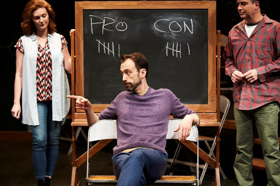Review: THE WHITE CHIP White-Knuckles Towards Sobriety at City Theatre

A recent hand injury prevented me from making it to the press night for City Theatre's The White Chip. I made it out the next week instead, and was relieved, both that I got to see the show, and that I did not see it the week before- the irony of my own nagging constant pain would have made the show a little close to home. This is one of those shows that is funny until, suddenly, it isn't- at which point it becomes a painfully specific, grueling mixture of tragedy and cringe comedy. Rehab and addiction dramedy has become somewhat mainstream lately, with Chuck Lorre's Mom earning acclaim within the boundaries of a multicam CBS sitcom. But nothing there hits as hard, on the comedy or drama side, as Daniels's autodrama does. Adroitly directed by Sheryl Kaller, this one-act play in ninety minutes sometimes feels as breezy as a moment, and sometimes as nightmarishly slow as molasses, all varying with the psychological state of our narrator.
Based on the true story of playwright and director Sean Daniels and his rocky journey to sobriety, The White Chip stars Kyle Cameron as Sean, a charismatic and promising young creative with a brilliant career and a drinking problem he refuses to acknowledge until it destroys not only his life, but the lives of the people he cares the most about. Filling in the gaps are Daina Michelle Griffith and Daniel Krell, who play all the women and all the men Sean ever interacts with, plus the nagging voices in his head... and, in a metatheatrical twist, they also play themselves. The White Chip occupies the theatrical space between TED talk, play, stand-up routine and one-man show. Kyle Cameron isn't actually Sean Daniels, whose work has been presented here at City Theatre before. But he's standing in for Daniels. Griffith and Krell, on the other hand, ARE the "friends" of the company assisting with the presentation. It plays simply, but it's complicated to talk about.
Cameron is an endearing, engaging performer, ideally suited to a vehicle like this. With the rhythms of a stand-up comic he banters with the audience in extended monologue, interspersed with actual scene work with partners Griffith and Krell. These dramatic interludes range from the comedic (Griffith as a nightmarishly intense Mormon camp counselor) to the dramatic (Krell and Griffith as theatre board members desperately trying to keep Sean from destroying his own life). Some of these interludes border on magic realism, particularly Krell's recurring role as a drawling, manipulative airport bartender who becomes the most self-destructive voice in Sean's head. As the show reaches its climax, these moments of direct dramatic interaction become less like interludes and more seamlessly integrated into the show's delivery.
Crucial to the show's second half are two intertwining threads: Sean's struggles with religion, and his struggles with family. Here, Griffith and Krell get their meatiest doubled roles. Griffith embodies Sean's prickly, ex-Mormon mother, verbally abusive and emotionally manipulative, while doubling as Sean's wife, a gentler presence trying to save him from himself... and eventually save herself from him. Krell, for his part, assumes numerous father figures- some benign (a roughneck rehab counselor) and some malign (that Stephen King-esque bartender)- that serve to fill Sean's paternal void. Sean's father has Parkinson's, and as his condition deteriorates alongside Sean's alcoholism, it becomes too painful for Sean to remain engaged in his father's dwindling life. His phone conversations with his father are some of the play's most uncomfortably real moments.
The bedrock beneath so many of these character interactions is Sean's agnosticism (I don't believe the word atheism is ever actually used). With so many methods of rehabilitation requiring submission to a higher power, Sean finds himself fumbling between a search for higher truth and a resolute belief that he can do it all himself. By the end, he entertains the notion that God and science are not mutually exclusive, and may or may not be nearly the same thing. It's crucial to the show's balanced tone that no one, even Sean, actively sneers at the concept of faith, or the positive impact it has had on so many addicts. While the proselytizing, born-again AA counselor may be a comic figure, he's never made an object of ridicule or even heavy satire; he's treated no differently than the Sober Jews, a group of mostly-secular Jewish recovery counselors who espouse a more science-based philosophy of addiction and recovery than the emotional, spiritual AA curriculum.
I am not an alcoholic- thank whatever god you believe in, because I know I do- but addiction runs in my family, and I've seen firsthand the effect substance abuse can have on people close to me. My own proclivity towards addictive, dopamine-dispensing behavior is a big factor in why I maintain an aggressively clean, borderline straightedge lifestyle (I probably consume less caffeine than most Mormons even). Watching this show, with its journey through hell and back to an open-ended, hopefully-happy-in-the-long-run ending, all I could think was, "there, but for me, go I." And if not myself, someone I know.
Maybe I talk too much about myself in these reviews- I've been called a blogger as much as a journalist- but theatre exists in communication. Shows like The White Chip exist explicitly in dialogue with the audience, not as words on a page. The nature of the presentational one-man show is a conversation: "let me tell you how it is." And I'm listening, Sean Daniels, I'm listening. I just hope that the people who need to hear this story are hearing it too.
Add Your Comment
Videos
